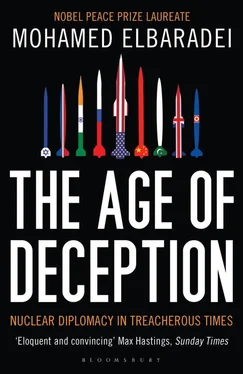Coming in the favorable wake of the NIE report, my mid-January 2008 meeting with Supreme Leader Ayatollah Ali Hoseyni Khamenei seemed propitious. I had to wade through a phalanx of officials to get there, but I was willing to be patient.
On the Lufthansa flight to Tehran, a couple of Iranians who lived abroad came to thank me for my refusal to buckle under pressure. They affirmed my sense that even Iranians who were not very fond of the ruling regime supported its quest to acquire technology.
One woman came to my seat to ask about my wife. “She is Iranian, isn’t she?”
“No,” I said, “she is Egyptian.” I pondered how quickly rumors can turn into fact.
On our first evening in Tehran, Aghazadeh hosted the customary opening dinner, in a former palace of the shah, part of a compound of palaces that had been built for him and his family. It was in northern Tehran, not far from where I was staying at the Esteqlal Hotel—itself no palace, if the finest the city had to offer.
The meetings got under way. To each of the Iranian officials with whom I spoke, I made a few core points: I was speaking not only as the Director General of the IAEA, but also as someone who was concerned about the interests of the Iranian people. I had no wish to see Iran subjected to escalating sanctions by the UN Security Council. It was important, I said, for Iran to create the right conditions to enable negotiation with the West—and the United States in particular—and to cultivate better relationships with its neighbors in the Gulf, who were becoming intimidated by the prospect of regional domination by Iran. I stressed the urgency of addressing the escalating concern over the ultimate aim of Iran’s enrichment program.
But at every opportunity, I drove home one key point: to seize the moment. The timing was very favorable for Iran, for three reasons: the recent U.S. National Intelligence Estimate; Iran’s cooperation with the IAEA under the work plan, which had resulted in a positive report to the Board; and a recent announcement by President Ahmadinejad stating that Iran had mastered nuclear fuel technology based on successfully assembling and operating three thousand centrifuges.
“All this,” I said, “puts you in a position of strength. The Americans would be willing to start negotiations if you suspended enrichment for even two months. Why not take the initiative? Rather than waiting for more pressure from the West, declare victory based on having mastered the technology and announce a two-month suspension as a way to show your good intentions.”
German foreign minister Steinmeier, I told them, would be meeting with his five counterparts on January 22. Russia and China had requested a strategy discussion before agreeing on any additional Security Council action. “Time is of the essence,” I warned them. “The earlier you move forward, the better your chance of preempting a third resolution.”
Yet the Iranian officials seemed rather relaxed about the nuclear situation. There was no sense of urgency. Foreign Minister Manouchehr Mottaki pointed out that Iran had tried in the past to compromise—suspending enrichment for a time or voluntarily implementing the Additional Protocol. They had received nothing for their actions. “Now it is up to the other side to also make some compromises,” he said.
Clearly, having the upper hand made the Iranians bold. Mottaki told me that Iran had improved security in Iraq. “Who do you think took care of Moktada al-Sadr and his militia?” he asked. Iran’s level of trade with countries such as the United Arab Emirates and China was at an all-time high, he said, in the tens of billions of dollars. So in terms of economic hardship, Iran was not intimidated or worried by the threat of additional sanctions. The prospect was more of a thumb in the eye, a matter of disrespect and insult.
What stood out from these conversations was the bewildering display of Iran’s political factions and power centers. Each official brought his own view of how to deal with the nuclear situation and with the West in general. Senior figures seemed to analyze the nuclear issue in terms of its impact not just on the country but also on their personal careers and prestige.
From the hard-liners’ perspective, a third Security Council resolution would reawaken resentment of the Americans, which would bolster the hardliners’ popularity just as a first round of elections for the Majlis approached in mid-March. Fears of a U.S. military strike had diminished and Iranians were starting to focus on the government’s miserable economic performance. For supporters of Khamenei, elections that delivered a more moderate Majlis would put the leader in a much stronger position to deal with the nuclear issue in a more conciliatory manner.
My meeting with Saeed Jalili, Iran’s new chief nuclear negotiator, was informative. He viewed the West with undisguised distrust and was especially critical of Javier Solana, his counterpart at the EU-3. At their last meeting, Jalili said, Solana had outlined four points for the dialogue between Iran and the P-5+1: democracy in the region; terrorism and arms control; energy needs; and economic cooperation. I was later told that Jalili had also come to the meeting ready to sign on to a Swiss proposal to limit the build-up of centrifuges, but Solana was not open to such a discussion. [30] I had heard none of this from Solana. His report had been only that the meeting had gone badly, achieving nothing after five hours. What I realized was that, despite frequent private assurances that he agreed with my point of view, Solana did not have the flexibility or the mandate to take initiative, particularly in light of U.S. insistence that nothing short of suspension was acceptable as a starting point.
“Before we engage in negotiation with the West,” Jalili concluded, “we need to establish a paradigm for what we are doing. Is this supposed to be a negotiation between two enemies or two friends?” It was a question I heard frequently from senior Iranian officials, reflecting their focus on the larger goal based on trust, mutual accommodation, and respect.
My meeting with Ahmadinejad took place in the president’s palace, another of the former shah’s residences, but the furnishings did not match in any way the grandiosity of the building.
Olli Heinonen and Vilmos Cserveny accompanied me. Ahmadinejad was soft-spoken and friendly in his reception. His personal style was in distinct contrast to his demonization in the West. He was courteous and reasonable throughout the exchange, although he plainly had strong views on what was right and wrong. I made my points firmly but did not try to confront or challenge him, intent as I was on moving things forward.
I avoided raising Ahmadinejad’s inflammatory statements about Israel and the Holocaust. I had been told by Farsi speakers that his notorious comment about Israel being “wiped off the map” had been a Western media misinterpretation. Ahmadinejad, they said, had been speaking not about the State of Israel but about the “Zionist regime.” I was reminded of an encounter in Jerusalem in 1977 when Menachem Begin, Israeli prime minister at the time, had given a speech to the Egyptian delegation in which he had invoked the assertion that there was “no such thing as a Palestinian people,” only Palestinian Arabs and Palestinian Jews. His statement, too, was emotionally charged; the question, then as now, was how to get past it and embark on meaningful dialogue. In any case, Ahmadinejad had been repeating a quote originally made by Iran’s first Islamist leader, Ayatollah Khomeini. However ill-advised, he would be unwilling to retract what he said and there was nothing to be gained by addressing it at this meeting.
Ahmadinejad responded positively when I stressed the need for Iran to improve relations with its neighbors. He mentioned that he had attended the Summit of the Gulf Cooperation Council. The Saudis, he said, had invited him to the Hadj. Clearly, public expression of cordial relations with Iran by many leaders in the Gulf contrasted pointedly with their private statements of fear and distrust.
Читать дальше












